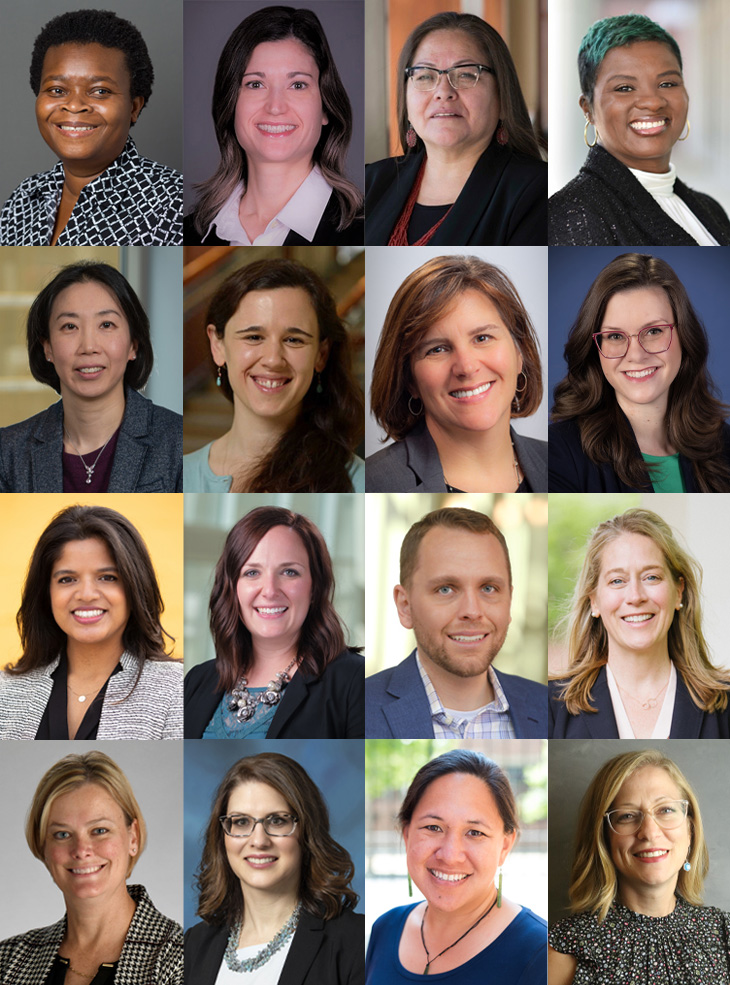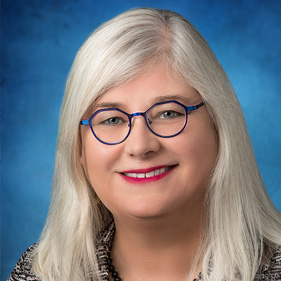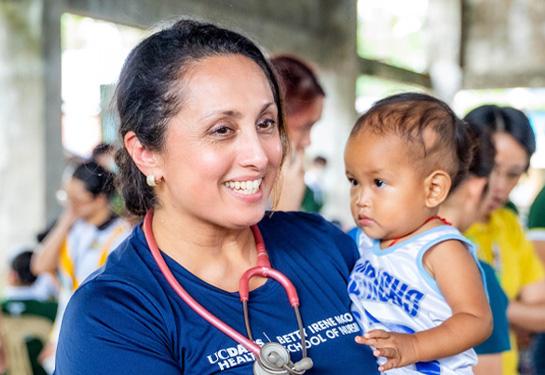UC Davis nursing school announces 2023 Betty Irene Moore Fellows
Program admits largest cohort ever with 16 diverse nurse scientists from around the U.S.
The newest group admitted to the Betty Irene Moore Fellowship for Nurse Leaders and Innovators at the Betty Irene Moore School of Nursing at UC Davis is the largest in the program's history. The national program office for the fellowship announced today that the cohort includes 16 members. The expansion is thanks to additional funding from the Gordon and Betty Moore Foundation.
Fourteen of the newest Betty Irene Moore Fellows are affiliated with major public and private universities across the country, while two are from major health systems and organizations. Heather M. Young, national program director for the fellowship and School of Nursing dean emerita, said the group is comprised of passionate nurse leaders dedicated to advancing health care, health equity and the nursing profession.
“We are delighted to welcome our largest group of fellows yet who are conducting research on essential topics such as sexual health across the lifespan, digital health interventions for underserved populations, and support for people and families managing chronic diseases,” Young said. “By tackling crucial health care challenges with novel strategies, they hold the potential to revolutionize population health and inject fresh perspectives into vital discussions within the field of nursing.”

The program recognizes early- to mid-career nursing scholars and innovators and requires they take part in an innovative research project or study. Fellows receive $450,000 in funding over three years for their project plus $50,000 for their home institution. Fellows gather annually at UC Davis for a week-long convocation and participate in an online learning community throughout the three-year period.
The fellowship launched in 2020 and is supported by a $37.5 million grant from the Gordon and Betty Moore Foundation. Roughly 10 fellows are selected every year for five years. This year the foundation awarded the fellowship an additional $7.4 million grant to build upon the momentum of the first three cohorts and expand future groups.
“We continue to be impressed each year by the high caliber of nurse leaders who apply for this novel fellowship program, and we are grateful to have the foundation’s support in expanding our cohorts,” Young said. “The foundation’s additional investment allows us to include more talented nurse scientists in our program who represent the future leaders of health care and are poised to make significant impacts and effect systems-level change.”
Projects leverage technology, focus on societal issues
The first group of fellows completes the three-year program in July. Fellows in the first cohort tackled projects focused on issues such as advancing health equity through prevention and education and developing technologies that support clinical decision making. Others used telehealth to help adolescents with neurological conditions and to offer remote forensic exams and web support for cancer treatment in underserved areas.
The second cohort is also focused on health equity issues and advancing care for special populations. Their projects include:
- Breastfeeding support for Black mothers
- Self-management strategies for adolescents with asthma
- Interventions for youth living with sickle cell disease
- Education for individuals who have diabetes
- Deaf and hard of hearing populations
- Sexual health
The third cohort is interested in health and mental health promotion, care for underserved populations and quality improvement using technology. They are working on projects such as:
- Advancing reproductive justice in underserved youth populations
- Supporting dementia caregivers in Black communities
- Tailoring health care interventions for people living with diabetes and end-stage kidney disease
Betty Irene Moore Fellows focus on populations across the lifespan and their projects aim to address issues in prevention, health care delivery and education. The incoming cohort has strength in sexual health and mental health promotion, quality improvement using technology, and care for aging and underserved populations.
By tackling crucial health care challenges with novel strategies, they hold the potential to revolutionize population health and inject fresh perspectives into vital discussions within the field of nursing.—Heather M. Young, fellowship program director
2023 fellows
- Forgive Avorgbedor, assistant professor at the UNC Greensboro School of Nursing: Avorgbedor’s research focuses on women’s reproductive health and cardiometabolic health, as well as interventions to promote healthy pregnancies and positive infant outcomes.
- Lynn Baniak, associate chief nurse for research at the Veterans Affairs Pittsburgh Healthcare System and adjunct faculty at the University of Pittsburg School of Nursing: Baniak’s research focuses on patient-centered treatments and interventions for adults with chronic diseases who are affected by sleep disorders.
- Teresa Brockie, assistant professor at the Johns Hopkins School of Nursing: Brockie’s research focuses on promoting health equity through community-based prevention and intervention services for trauma and suicide in vulnerable populations.
- Crystal Chapman Lambert, associate professor at the University of Alabama at Birmingham School of Nursing and associate director of the Center for Outcomes and Effectiveness Research and Education at the University of Alabama at Birmingham: Chapman Lambert’s research focuses on improving health outcomes for minority populations, particularly women living with human immunodeficiency virus (HIV).
- Jane Chung, assistant professor at the Virginia Commonwealth University School of Nursing: Chung’s research focuses on evaluating and applying sensors and other emerging technologies to promote healthy aging in older adults.
- Rebecca Clark, assistant professor at the University of Pennsylvania School of Nursing and nurse scientist at Pennsylvania Hospital: Clark’s research focuses on transforming inpatient maternity care to improve health equity and address health disparities in birth outcomes.
- Elizabeth Dickson, assistant professor at the University of New Mexico College of Nursing and assistant professor at the University of New Mexico College of Population Health: Dickson’s research focuses on adolescent health and sexual health education.
- Jessica Draughon Moret, associate professor at the Betty Irene Moore School of Nursing at UC Davis: Draughon Moret’s research focuses on structural and independent factors contributing to women’s health disparities.
- Jean Edward, associate professor and assistant dean of diversity, equity and inclusion at the University of Kentucky College of Nursing: Edward’s research focuses on advancing equity in health care for underserved communities by addressing the social determinants of health that impact access, affordability, and health outcomes.
- Breanna Hetland, assistant professor at the University of Nebraska Medical Center College of Nursing and nurse scientist at Nebraska Medicine: Hetland’s research focuses on merging technology with nonpharmacological healing approaches to positively engage patients and family caregivers living with critical illnesses.
- Mitchell Knisely, associate professor at the Duke University School of Nursing: Knisely’s research focuses on the treatment of acute and chronic pain using precision health and nonpharmacological approaches.
- Virginia LeBaron, Kluge-Schakat associate professor at the University of Virginia School of Nursing: LeBaron’s research focuses on palliative care for adult cancer patients and using technology to improve cancer pain management and communication between patients and providers.
- Heather Nelson-Brantley, assistant professor and leadership program director at the University of Kansas Medical Center School of Nursing: Nelson-Brantley’s research focuses on cancer and palliative care, as well as organizational change and improving patient and provider communications.
- Marci Nilsen, assistant professor at the University of Pittsburgh School of Nursing and the University of Pittsburgh School of Medicine: Nilsen’s research focuses on identifying, developing and implementing treatment and symptom management interventions for people who have survived head and neck cancer.
- Donna-Marie Palakiko, assistant professor at the University of Hawaii at Manoa Nancy Atmospera-Walch School of Nursing: Palakiko’s research focuses on addressing social and cultural determinants of health among indigenous populations using culturally sensitive and community-based participatory approaches.
- Whitney Thurman, assistant professor at the University of Texas at Austin School of Nursing: Thurman’s research focuses on interventions to improve health and social outcomes for people living with disabilities and experiencing homelessness.
Applicants completed a rigorous application and interview process. National program office leaders, along with members of the Fellowship National Advisory Council ultimately selected a diverse group pursuing innovative approaches to challenging problems. The program forms a learning community across the fellowship cohorts, combined with a strong curriculum to build skills and confidence in anti-racist leadership, innovation, and strategic communications.
Faculty from the UC Davis Graduate School of Management contributed their expertise to develop the hybrid online curriculum for the fellows. It is designed to enhance leadership and innovation capacity, strengthen strategic thinking and collaborative skills, expand professional networks and propel innovative ideas to fruition.
Applications for the 2024 cohort open Sept. 22. To learn more, visit the fellowship program webpage.




